新概念英语第三册Lesson 21 Daniel Mendoza•课件(共25张PPT)
文档属性
| 名称 | 新概念英语第三册Lesson 21 Daniel Mendoza•课件(共25张PPT) | 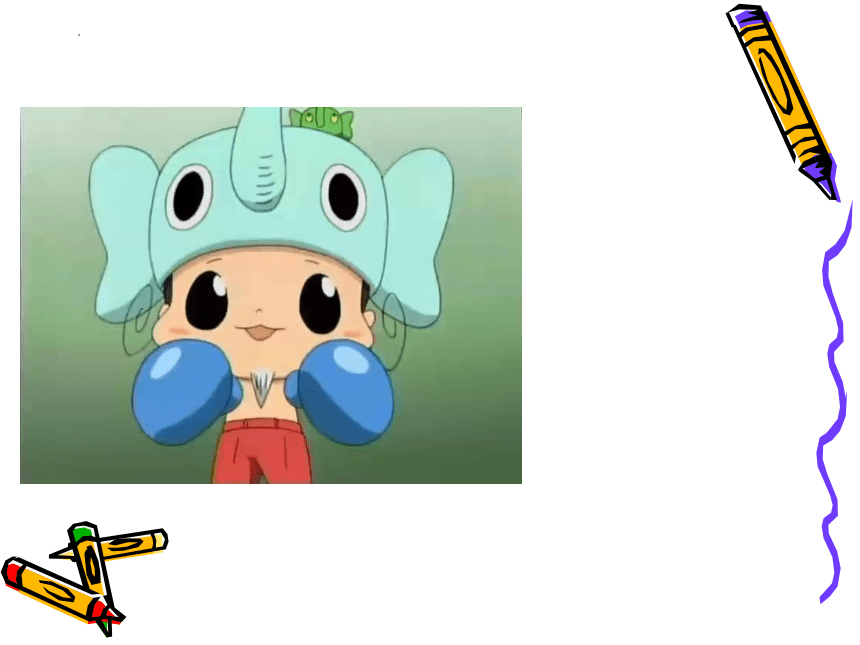 | |
| 格式 | pptx | ||
| 文件大小 | 586.3KB | ||
| 资源类型 | 教案 | ||
| 版本资源 | 新概念英语 | ||
| 科目 | 英语 | ||
| 更新时间 | 2024-02-20 20:03:11 | ||
图片预览

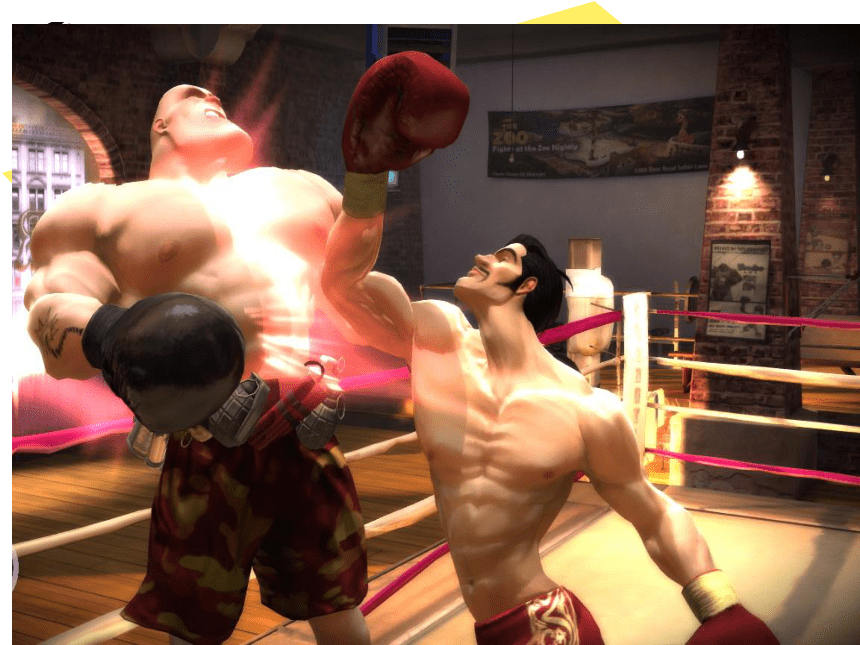
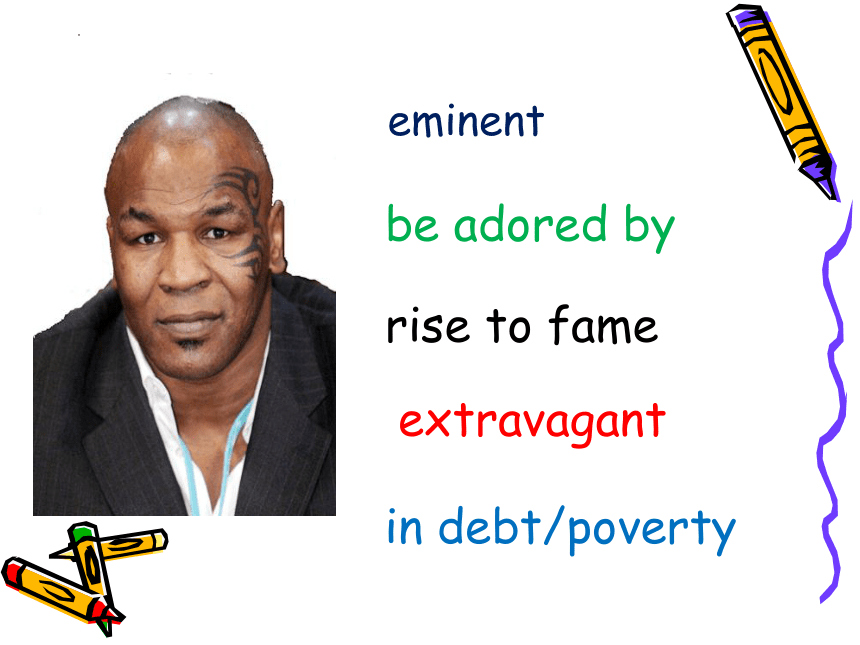
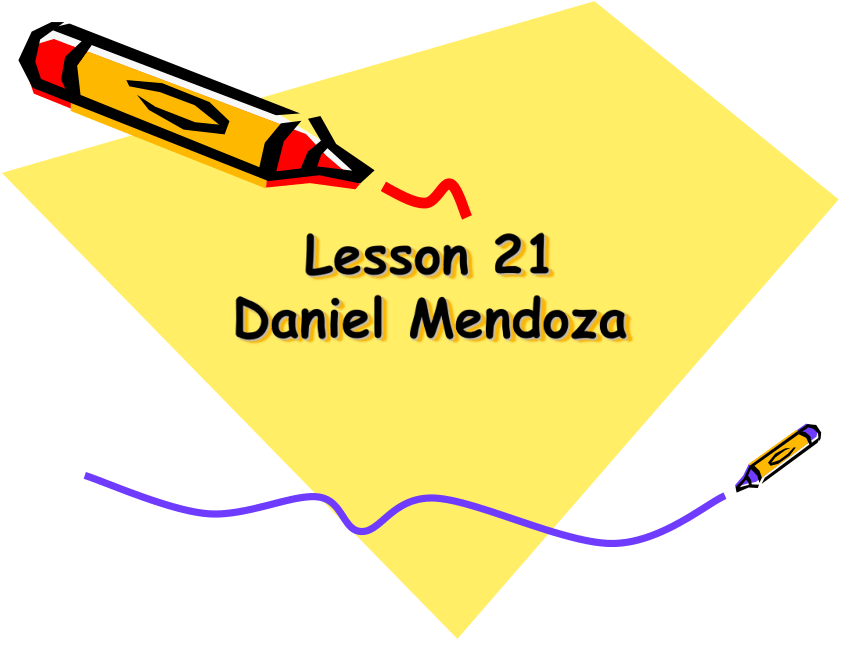
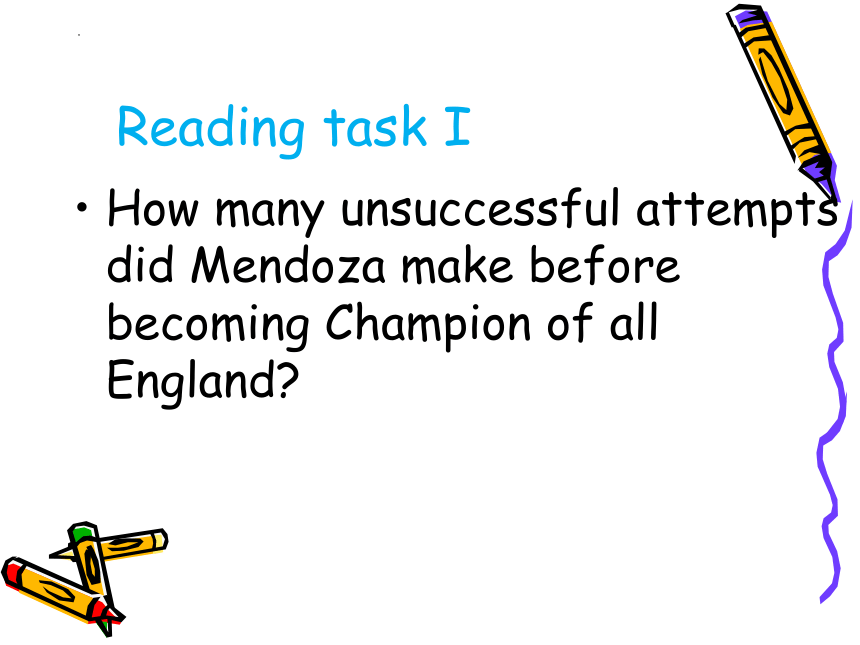
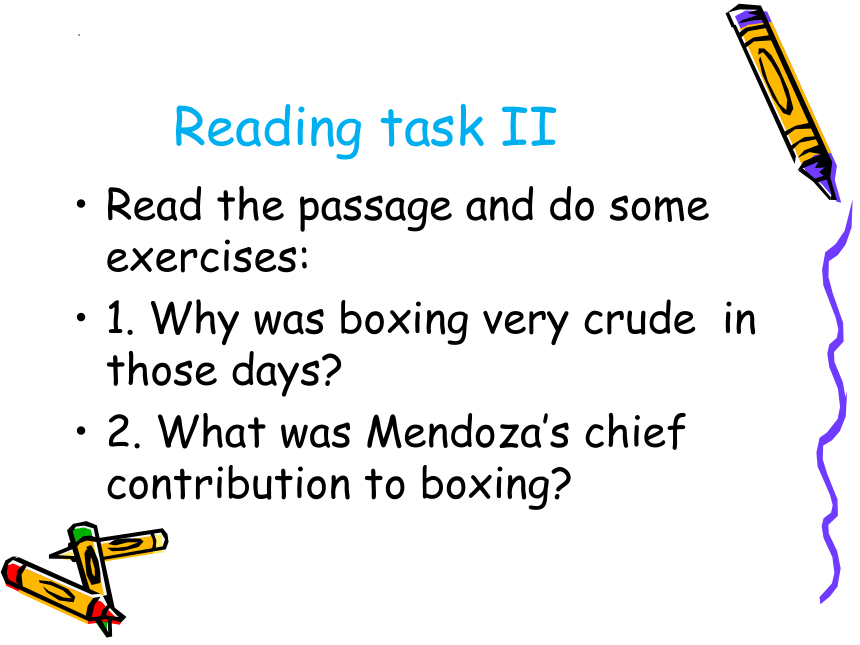
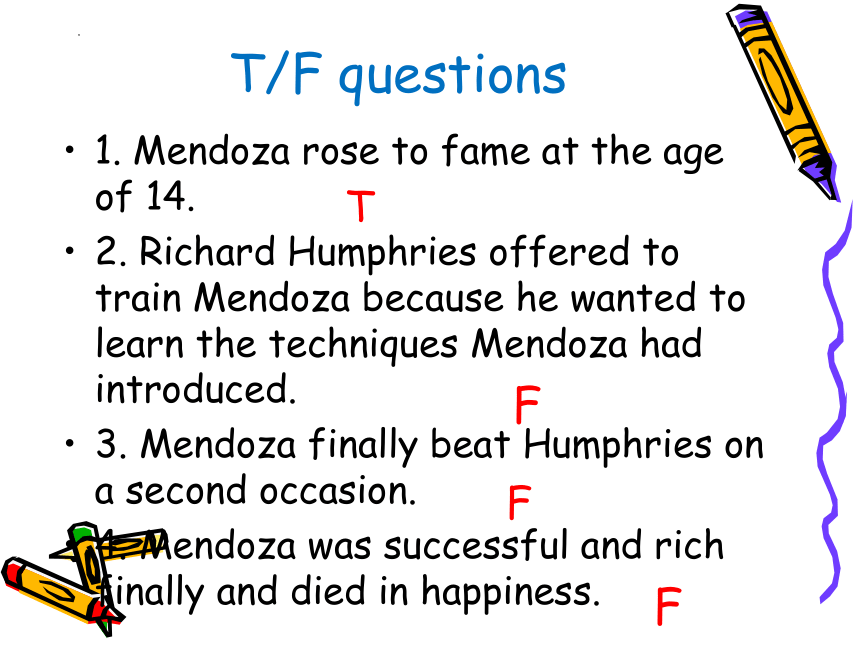
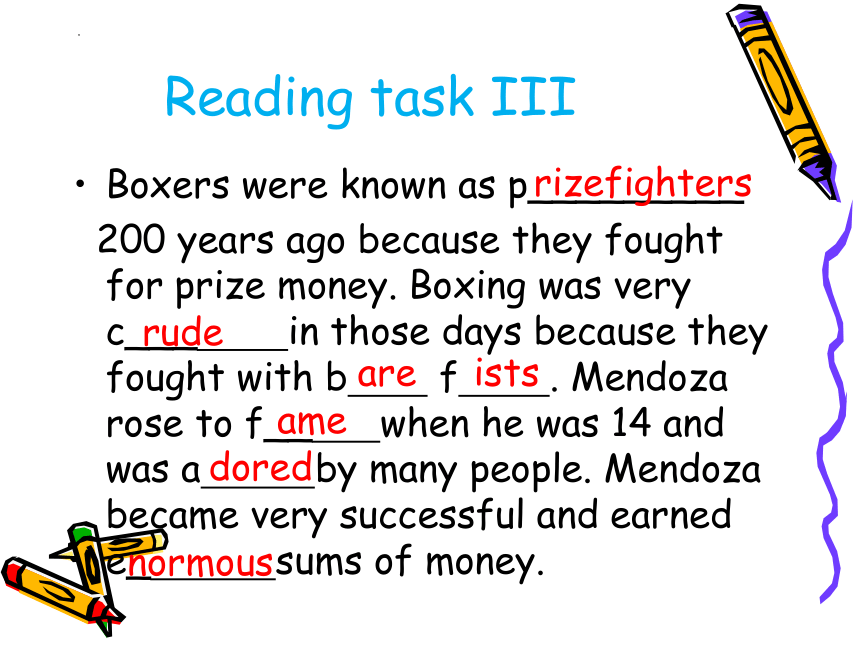
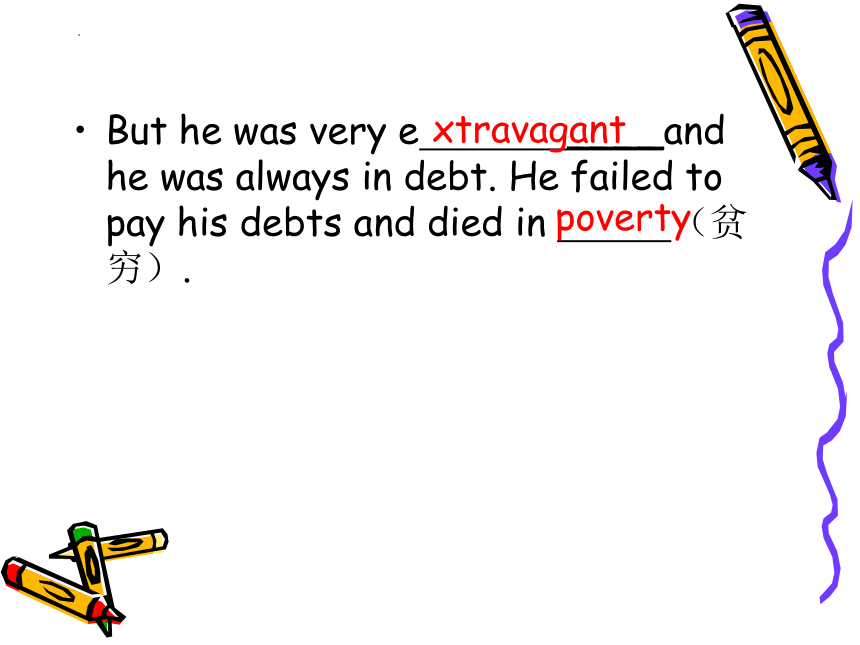
文档简介
(共25张PPT)
eminent
be adored by
rise to fame
extravagant
in debt/poverty
Lesson 21
Daniel Mendoza
Reading task I
How many unsuccessful attempts did Mendoza make before becoming Champion of all England
Reading task II
Read the passage and do some exercises:
1. Why was boxing very crude in those days
2. What was Mendoza’s chief contribution to boxing
T/F questions
1. Mendoza rose to fame at the age of 14.
2. Richard Humphries offered to train Mendoza because he wanted to learn the techniques Mendoza had introduced.
3. Mendoza finally beat Humphries on a second occasion.
4. Mendoza was successful and rich finally and died in happiness.
T
F
F
F
Reading task III
Boxers were known as p_________
200 years ago because they fought for prize money. Boxing was very c___ in those days because they fought with b f . Mendoza rose to f__ when he was 14 and was a by many people. Mendoza became very successful and earned e_ sums of money.
rizefighters
rude
are
ists
dored
ame
normous
But he was very e ____and he was always in debt. He failed to pay his debts and died in (贫穷).
xtravagant
poverty
Group work
1. Tell your members about a boxing match that you have seen.
2. Violent sports like boxing should be banned. What do you think Discuss with your group members.
New words and expression
boxing n.拳击
boxer n.拳击手
bare adj.赤裸的(= uncovered adj.无盖的)
prizefighter n.职业拳击手(尤指古时赤手拳击手)
crude adj.粗野的
marquis n.侯爵
technically adv.严格根据法律意义地
science n.科学
popularity n.名望(n.普及, 流行, 声望)
adore v.崇拜, 爱戴(= worship vi.敬神, 拜神 vt.崇拜, 尊敬)
alike adv.一样地
fame n.名声
eminent adj.著名的,杰出的
bitterly adv.厉害地
bet v.打赌
academy n.专业学校
extravagant adj.浪费的,奢移
poverty n.贫困(in poverty 在贫困中)
反义词:thrifty, frugal, economical
▲ Boxing matches were very popular in England two hundred years ago.
popular adj.通俗的, 流行的, 受欢迎的
-- be popular with sb 受某人喜爱
-- The famous actor is popular with young people.
popularity n.
be popular = be in popularity
Instant foods are getting in popularity.
Popular songs are in popularity.
▲ bare fist = bare fisted adj.赤手空拳的 adv.赤手空拳地
bare foot = barefooted adj.光着脚的 adv.未戴帽地
barehanded(adj.赤手空拳的) barelegged(adj.露腿的 adv.光着腿的)
bare-necked(adj.露出脖子的) bareheaded(adj.不戴帽子的)
naked adj.全裸, 赤裸的, 裸体的
-- He‘s walking in bare feet.
他光着双脚走路。
-- He is naked. = he has nothing on.
他什么也没穿。
because of :
as a result of 由于
due to/owing to
thanks to
on account of
The delay was due to heavy traffic.
Hundreds of people lost their homes as a result of the war.
▲ crude adj.粗野的
be crude to somebody
-- He is crude to the girl.
Rude adj.粗鲁的, 无礼的(比crude的语气要弱)
▲The use of gloves was not introduced until 1860, when the Marquis of Queensberry drew up the first set of rules.
introduce(vt.传入, 引进)= bring in(介绍引进)
-- Potatoes were introduced into Europe from South America.
draw up vt.1. 制定、起草 2 车辆 停
-- draw up a plan
The taxi drew up outside the house.
Non-restricted attributive clause 非限制定语从句
draw back /draw out /draw on /draw a useful lesson from
1. The days are now that it’s spring.
2. The company from fulfilling the agreement and wanted to talk about a new contract.
3. A writer has to his imagination and experience.
drawing out 拉长,延长,渐长/draw in 渐短
drew back 撤回,收回
draw on 运用,使用
▲Though he was technically a prizefighter, Mendoza did much to change crude prizefighting into a sport, for he brought science to the game.
技术 技术的,技能的
技巧,技法 技术员,技师
Despite the fact that ….
technology
technique
technical
technician
▲He was adored by rich and poor alike.
adore sb/sth/doing sth 喜爱做某事
I adore swimming.
admire sb for sth 因…而钦佩
alike adv.一样地
= similarly adv.同样地, 类似于
= equally adv.同样地, 相等地, 平等地
= as well 也, 又, 同样
= in the same way adv.同样地
▲ Mendoza rose to fame swiftly after a boxing match when he was only fourteen years old.
rise to fame = become famous
一夜成名
Similar expressions:
have a good/high reputation for 因…而享有好名声
make one’s name
make a name for oneself 成名,出名
时间状语从句
▲In fact, Mendoza soon became so successful that Humphries turned against him.
turn against… 变成和...敌对
She turned him against his family by constantly criticizing them.
turn down
turn to sb
turn up
拒绝
求助于
上升,出现,出席,到达
目的状语从句
▲bet v.打赌
bet on sth 以…打赌
-- The public bet on Tom.
公众把赌注押在汤姆的身上。
bet sb that 和某人打赌
-- I bet her I would win the march.
bet one‘s bottom dollar on…
孤注一掷在…上
-- He bet his bottom dollar on his last attempt.
bet on the wrong horse [口]判断或估计错误
I bet. 我打赌, 我肯定。
You bet. [俗]当然, 真的, 的确(= certainly)
▲Mendoza met Humphries in the ring on a later occasion and he lost for a second time.
on an occasion
on another occasion
on occasion
on this occasion
on several occasions
for a second time = he lost again
偶尔
▲It was not until his third match in 1790 that he finally beat Humphries and became Champion of England.
It is/was …that 强调句型
还原:
倒装:
He didn’t beat Humphries finally and become Champion of England until….
Not until his third match in 1790 did he finally beat..and become….
eminent
be adored by
rise to fame
extravagant
in debt/poverty
Lesson 21
Daniel Mendoza
Reading task I
How many unsuccessful attempts did Mendoza make before becoming Champion of all England
Reading task II
Read the passage and do some exercises:
1. Why was boxing very crude in those days
2. What was Mendoza’s chief contribution to boxing
T/F questions
1. Mendoza rose to fame at the age of 14.
2. Richard Humphries offered to train Mendoza because he wanted to learn the techniques Mendoza had introduced.
3. Mendoza finally beat Humphries on a second occasion.
4. Mendoza was successful and rich finally and died in happiness.
T
F
F
F
Reading task III
Boxers were known as p_________
200 years ago because they fought for prize money. Boxing was very c___ in those days because they fought with b f . Mendoza rose to f__ when he was 14 and was a by many people. Mendoza became very successful and earned e_ sums of money.
rizefighters
rude
are
ists
dored
ame
normous
But he was very e ____and he was always in debt. He failed to pay his debts and died in (贫穷).
xtravagant
poverty
Group work
1. Tell your members about a boxing match that you have seen.
2. Violent sports like boxing should be banned. What do you think Discuss with your group members.
New words and expression
boxing n.拳击
boxer n.拳击手
bare adj.赤裸的(= uncovered adj.无盖的)
prizefighter n.职业拳击手(尤指古时赤手拳击手)
crude adj.粗野的
marquis n.侯爵
technically adv.严格根据法律意义地
science n.科学
popularity n.名望(n.普及, 流行, 声望)
adore v.崇拜, 爱戴(= worship vi.敬神, 拜神 vt.崇拜, 尊敬)
alike adv.一样地
fame n.名声
eminent adj.著名的,杰出的
bitterly adv.厉害地
bet v.打赌
academy n.专业学校
extravagant adj.浪费的,奢移
poverty n.贫困(in poverty 在贫困中)
反义词:thrifty, frugal, economical
▲ Boxing matches were very popular in England two hundred years ago.
popular adj.通俗的, 流行的, 受欢迎的
-- be popular with sb 受某人喜爱
-- The famous actor is popular with young people.
popularity n.
be popular = be in popularity
Instant foods are getting in popularity.
Popular songs are in popularity.
▲ bare fist = bare fisted adj.赤手空拳的 adv.赤手空拳地
bare foot = barefooted adj.光着脚的 adv.未戴帽地
barehanded(adj.赤手空拳的) barelegged(adj.露腿的 adv.光着腿的)
bare-necked(adj.露出脖子的) bareheaded(adj.不戴帽子的)
naked adj.全裸, 赤裸的, 裸体的
-- He‘s walking in bare feet.
他光着双脚走路。
-- He is naked. = he has nothing on.
他什么也没穿。
because of :
as a result of 由于
due to/owing to
thanks to
on account of
The delay was due to heavy traffic.
Hundreds of people lost their homes as a result of the war.
▲ crude adj.粗野的
be crude to somebody
-- He is crude to the girl.
Rude adj.粗鲁的, 无礼的(比crude的语气要弱)
▲The use of gloves was not introduced until 1860, when the Marquis of Queensberry drew up the first set of rules.
introduce(vt.传入, 引进)= bring in(介绍引进)
-- Potatoes were introduced into Europe from South America.
draw up vt.1. 制定、起草 2 车辆 停
-- draw up a plan
The taxi drew up outside the house.
Non-restricted attributive clause 非限制定语从句
draw back /draw out /draw on /draw a useful lesson from
1. The days are now that it’s spring.
2. The company from fulfilling the agreement and wanted to talk about a new contract.
3. A writer has to his imagination and experience.
drawing out 拉长,延长,渐长/draw in 渐短
drew back 撤回,收回
draw on 运用,使用
▲Though he was technically a prizefighter, Mendoza did much to change crude prizefighting into a sport, for he brought science to the game.
技术 技术的,技能的
技巧,技法 技术员,技师
Despite the fact that ….
technology
technique
technical
technician
▲He was adored by rich and poor alike.
adore sb/sth/doing sth 喜爱做某事
I adore swimming.
admire sb for sth 因…而钦佩
alike adv.一样地
= similarly adv.同样地, 类似于
= equally adv.同样地, 相等地, 平等地
= as well 也, 又, 同样
= in the same way adv.同样地
▲ Mendoza rose to fame swiftly after a boxing match when he was only fourteen years old.
rise to fame = become famous
一夜成名
Similar expressions:
have a good/high reputation for 因…而享有好名声
make one’s name
make a name for oneself 成名,出名
时间状语从句
▲In fact, Mendoza soon became so successful that Humphries turned against him.
turn against… 变成和...敌对
She turned him against his family by constantly criticizing them.
turn down
turn to sb
turn up
拒绝
求助于
上升,出现,出席,到达
目的状语从句
▲bet v.打赌
bet on sth 以…打赌
-- The public bet on Tom.
公众把赌注押在汤姆的身上。
bet sb that 和某人打赌
-- I bet her I would win the march.
bet one‘s bottom dollar on…
孤注一掷在…上
-- He bet his bottom dollar on his last attempt.
bet on the wrong horse [口]判断或估计错误
I bet. 我打赌, 我肯定。
You bet. [俗]当然, 真的, 的确(= certainly)
▲Mendoza met Humphries in the ring on a later occasion and he lost for a second time.
on an occasion
on another occasion
on occasion
on this occasion
on several occasions
for a second time = he lost again
偶尔
▲It was not until his third match in 1790 that he finally beat Humphries and became Champion of England.
It is/was …that 强调句型
还原:
倒装:
He didn’t beat Humphries finally and become Champion of England until….
Not until his third match in 1790 did he finally beat..and become….
同课章节目录
